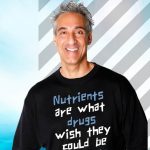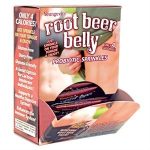The Ketogenic Diet explained by Pharmacist Ben Fuchs
Pharmacist Ben Fuchs was recently interviewed about the ketogenic diet. Here’s what Pharmacist Ben had to say….

So it’s high fat, low carb diet. They say moderate protein, but basically, the most important components are lots of fat in the presence of a little bit of carbs. When the body is in this kind of environment, where there’s a lot of fat around, but there’s not a lot of carbs, it’s forced to derive energy from fat. It’s forced to become a fat burner and that’s what we’re looking for for several reasons.
Number one, you get a lot more energy from fat. Fat, gram for gram, contains twice as much energy as carbohydrates. Number two, when you’re generating energy from fat, you don’t have to deal with all of the byproducts of sugar. When Sugar burns; it’s very dirty. If you take sugar and you put it in a saucepan and burn it, it’ll flame, but it’ll leave this kind of crusty, hard cookie caramel stuff behind. Well, that same thing happens inside the body, albeit at a molecular level, you get molecular crustys.
These molecular crustys are very reactive. In fact, they create a by-product called Advanced Glycosylated End products, advanced glycosylated end products (A-G-Es or AGES) and if you’re a diabetic you’ll actually have these little advanced glycosylated end products measured. Have you ever heard of a test called the haemoglobin A1C test? The haemoglobin A1C test is a test for how much caramelizing your body’s sugar and proteins are doing. It’s a marker of Health for diabetics.
So, sugar is a dirty fuel, fat is a clean fuel. Sugar is an inefficient fuel, fat is an efficient fuel and even better, and this is where the term ketogenic comes from, when fats are burned for energy, not only do you get a cleaner fuel and not only do you get more energy gram for gram, but you also get something called ketones. Ketones are a by-product of fat burning and these ketones are extremely energy friendly. These ketones are very easy for the muscle to use, for the brain to use, for the heart to use and for the liver to use.
So, not only do you get all of the benefits of fat burning, as opposed to sugar burning, cleaner energy, more energy plus you get to burn your fat. Most of us are walking around with a bunch of fat. We have a lot more fat stored on us than we do sugar. There are small amounts of sugar, but we have a lot of fat, for the most part, so not only do you get more energy, not only do you get more efficient and cleaner energy, but you get to burn the energy on your body. This is why the ketogenic diet, a high-fat diet, is actually counter-intuitive. It’s really a way to lose fat. 
Well, as it turns out the more fat you eat in the presence of low carbohydrate, this induces the body to be a fat burner. This is a very interesting phenomenon because it seems like, “Oh, I’m going to eat fat, I’m going to get fat.” No! If you eat fat when there’s not a lot of carbohydrates present, over the course of time your body will shift over from burning sugar to burning fat and this is why the ketogenic diet or the high high-fat is a fat loss diet. That’s why I say eat fat, lose fat. How cool is that, right? Eat fat, lose fat.
Now getting back to the ketones, where the term ketogenic comes from and I don’t want to get into science, but it’s kind of interesting, ketones are a very high-energy compound. Fat itself is going to be high energy relative to proteins and carbohydrates. Like I said, it’s got twice as much energy as carbohydrates and protein, but even better when you burn fat, you get these ketones, which are like super mega high-energy compounds that are used specifically by the heart, by the brain as well as by muscle and by the liver. So when you eat fat in the presence of low carbs, you become a fat burner, you lose body fat, you get a more efficient and cleaner source of fat and as a bonus you produce these wonderful high-powered compounds called ketones, which are even better for energy than straight fat is. That’s a lot of benefits, right?
Q: What’s the difference between the keto diet and the Paleo diet?
Ben: The Paleo diet is a high-protein diet and the ketogenic diet is a moderate protein, high-fat, low carb diet. The Paleo diet is similar except the focus in the Paleo diet is more on protein than it is on fat. The Paleo diet is a high-protein, moderate to high-fat, low-carb diet. Both of them, both the Paleo diet and the ketogenic diet understand the importance of keeping your carbohydrates down.
The Paleo diet puts the focus on protein and the ketogenic diet puts the focus on fat. The reason I prefer the ketogenic diet to the Paleo diet is because with the Paleo diet, eating a lot of protein can be counterproductive to losing weight because the body is very efficient at turning protein into sugar and then into fat.
So if you’re going to go Paleo or you are going to go high-protein, but you’re not working out or you’re not using that protein to build tissue, you’re not repairing from surgery or for some reason you’re not utilizing the protein, you can end up not losing weight, you can end up getting fat and you can end up raising your blood sugar. For diabetics 
You can’t just sit there and eat hamburgers and steak and eggs and fish and all these high protein foods and then sit around on the couch and watch TV. You’re not going to lose the weight and the likelihood of keeping your blood sugar high or raising your blood sugar is also going to be high. I prefer the ketogenic diet because the ketogenic diet shifts your metabolism over into fat-burning in a way that the Paleo diet doesn’t.
Q: Who should do the ketogenic diet?
Ben: Everybody benefits from the ketogenic diet. It’s the way we’re supposed to eat, in my humble opinion; high-fat low-carb, that’s the ideal way for human beings to eat. The body loves ketones. The body prefers to run, to derive its energy, to do its processes via ketones. It is the ultimate way to eat for everybody and as I said, I’m not sure if I mentioned this earlier, but babies are in ketosis and babies are in a high growth stage. Obviously, that’s the time when nature has mandated that we’ll be at maximum growth, is when we’re babies. Breast milk, as it turns out, is incredibly ketogenic and babies that are nursing are in ketosis.
The ketogenic diet is the ideal diet for everybody. But if you’re dealing with cancer, if you have diabetes, if you have weight to lose, if you have liver problems, the ketogenic diet is extra important, and for brain health issues, it is the ultimate way to eat. By brain health issues, I’m talking about dementia, I’m talking about Parkinson’s disease and movement disorders, and I’m talking about seizures. In fact, the ketogenic diet was actually developed as an anti-seizure diet and to this day, if you have what are called refractory seizures, that is seizures that are non-responsive to pharmacological anticonvulsants, like Dilantin and Tegretol, the mainstream medical model will recommend the ketogenic diet for you for seizure disorders.
You have to ask why is it that the ketogenic diet is used to treat seizure disorders. Why is it that the ketogenic diet has anti-cancer benefits? Why is it that the ketogenic diet has anti-aging benefits? Well, it turns out, that in addition to the production of ketones, which are the body’s preferred source of fuel, the ketogenic diet is a calm-you-down diet. It’s a way of calming down the biochemistry of the body. It’s a way of cooling things down. Cancer is a high energy state. Seizure disorders are a high energy state. Aging is a high energy state, even diabetes itself is a high energy state, in the sense that the body has a problem being responsive to insulin, so sugar tends to build up.
The ketogenic diet has a calming effect on the body. This calming effect creates a situation where there are multiple benefits. That’s why I say, the ketogenic diet, while it’s especially important for people who want to lose weight, or have diabetes, or have seizure disorders, or dementia, or movement problems, it is a perfect diet for everybody because it calms you down. The ketogenic diet has anti-anxiety benefits, it has benefits for women who are dealing with
Q: What would you say to people who say I have cancer and I’m worried about the acidity of it?
Ben: What acidity? What are you talking about, acidity? There’s no acidity. In fact, the ketogenic diet, will, because it’s a slow calm-you-down diet is an anti-acid diet. I’m not sure where you get the idea that you’d be more acidic with the ketogenic diet, but that’s not even the point because cancer and acid are related in the sense that acid is a toxin or acid is a by-product of toxicity. So it’s not acid per se that’s a problem, it’s the acid that is a by-product of toxicity and the way we alkalinize – the best way to alkalinize is to keep toxins out of your body, especially sugar, and to make sure you’re oxygenating.
Oxygen is the way nature has mandated that we alkalinize our body. Oxygen is alkaline, carbon dioxide is acid. As you’re inhaling oxygen, you’re alkalinizing and as you’re exhaling carbon dioxide, you’re removing acid, so you’re also alkalinizing. Respiration is the way we’re supposed to maintain our blood ph. The ketogenic diet is not going to have a negative effect on acidity and how I would respond to people who are worried about that I would tell them, “The ketogenic diet is the ultimate anti-cancer diet because it slows and calms the body down and you get to have fat.” We also love fat because we evolved in a world where fat was a beneficial food group. Fat is super high energy. As I say fat has more calories, more energy per gram, twice as much energy per gram than protein and sugar. We evolved to be sugar cravers and we evolved to be fat cravers because of their high energy, the amount of energy that is contained in them, but especially fat because it’s got so much more energy than sugar or protein.
Q: That’s good news for all of us who like to eat fat stuff.
Ben: Well, now here’s the thing. We’re not talking French fry fat, we’re not talking potato chip fat, 
These are high-quality fatty foods and so when you’re selecting your fats, you’ve got to make sure that they’re whole fats, they’re not cooked, they’re not processed fats and they’re fats that are found in foods that are healthy foods. You have to be careful with the kind of fats you choose, although that being said, fats are definitely, definitely, definitely, the most powerful of all three food groups, fats, proteins and carbohydrates.
Q: What do people do if they have trouble digesting fats?
Ben: Okay. If you want to go ketogenic, but say you have your gallbladder removed or you have a liver problem or you’re not producing enough digestive enzymes, all of these will make it difficult for you to go high-fat. If you decide you’re going to up your fats, remember the ketogenic diet is like 60 to 80 percent of your calories from fat. Say you’re getting 40% your calories from fats, now you want to double it, you want to go ketogenic and you notice you’re not comfortable. Well, there are a couple things you could do.
First of all, you definitely use digestive enzymes, 
In addition to apple cider vinegar helping you digest your fats, your protein and your food in general, apple cider vinegar itself is ketogenic. Lecithin is a kind of food derivative that you can get at a health food store, and that can also help you process your fats. Anything you do for liver health because the liver is your main fat processing organ that can also help you process fats. The B vitamins are important for the liver. 
Q: In the past, we’ve talked about the importance of moving our lymphatic system. Why is it extra important if you’re on the ketogenic diet?
Ben: The lymph is where fats are transported. The lymph is the circulatory system for fats. Fats have to travel through the circulation and they don’t really go through the blood as much as they go through the lymphatic system. The lymphatic system can be thought of in fact, as a circulatory system for fats and fatty vitamins. The lymphatic system is also a circulatory system for toxins. As toxins build up in the body, and particularly in the lymph, fat digestion can be compromised. So anything you can do to support the movement of fluid through the lymph is going to help your body if you’re going ketogenic and you’re dealing with an excess of, or an increased amount of fats.
Moving the body is how the lymphatic system moves, how fluids move through the lymph. The lymph is part of the circulatory system meaning it circulates around the body. It goes around in a circle. The circulatory system goes through the heart and goes through all the organs and comes back to the heart and goes through all the organs. It forms a circle. The blood part of the circulatory system is moved by a pumping action that is the heart. That’s the function of the heart – to pump blood through the circulatory system.
The lymph doesn’t have that same responsiveness to the heart. It depends on us moving and it depends on our lung movements or respiratory muscles in order to move. If you’re going to go high-fat and you’re sedentary, or if you’re going high-fat and you’ve got lymphatic congestion from toxicity, the excessive amounts of fats may further clog up the lymph and they may make it more difficult for lymphatic fluids to travel.
So moving your body is always important for lymphatic movement or lymphatic circulation, but it’s extra important if you’re loading your body up with fat. It’s also important to move the lymph around after you eat. The lymph gets super loaded and if you’re eating fat it gets extra super loaded after meals. After meals, and particularly after fatty meals, it becomes important to go take a walk or do some kind of movement, so you can facilitate the circulation of fluids through the lymphatic system after you’ve flooded the lymph with foods, especially with fatty food material.
Okay, so let me say one more thing. 


Also, fiber acts as a source of nourishment for good bacteria in the gut. Making sure that you’re getting enough fiber and as we said earlier, that’ll give you the bonus of producing short-chain fatty acids, which themselves are ketogenic. Eating fiber not only supports digestive health and not only supports the health of probiotics but eating fiber can ultimately also help you produce more ketones via the activity of short-chain fatty acids, which are produced as bacteria, feed on that fiber.
Q: When you say eating fiber, it’s more fiber through vegetables, instead of taking the scoops full of powder, right?
Ben: Absolutely, absolutely. The scoops full of powder are, they’re a pale, pale substitute for regular fiber. When you eat fiber from vegetables you not only get the fiber, but you get all the other stuff in the vegetables. You get the phytonutrients and vegetables also contain nitrogen and nitrogen is also important for the gut, for intestinal bacteria, for gut bacteria. Vegetables provide you not just… Vegetable fiber provides you not just the fiber, but it also provides you with the nitrates and the nitrites, which are important for the bacteria.
Eating vegetables is really the best way to go. I love vegetable juices because you can get a lot of vegetables in vegetable juice. You get a lot more vegetables, I can anyway. I can eat a lot more vegetables in a juice than I can in a salad; much quicker, you can guzzle it down, you don’t have to sit and chop and you don’t have to sit and make your salad and you can drink it on the go, you can drink it in the car, you can drink it when you’re doing your work.
Vegetable juices are just an amazing nutritional substance because of their handiness, their potability, not to mention their incredible nutritional value. I’m not talking V8 here. I’m talking about juicing vegetables, and not just juicing vegetables because ordinary juicers, you’ll lose the fiber, right? I’m talking about juicing your vegetables in a high-powered blender like a Vitamix or a Nutribullet or a Ninja. The Vitamix or the high-powered blender type, they’re not really juicers, but high-powered blender type mixing devices. Those allow you to juice and you keep the fiber. So low calorie, high-fat, low carb, moderate protein.


